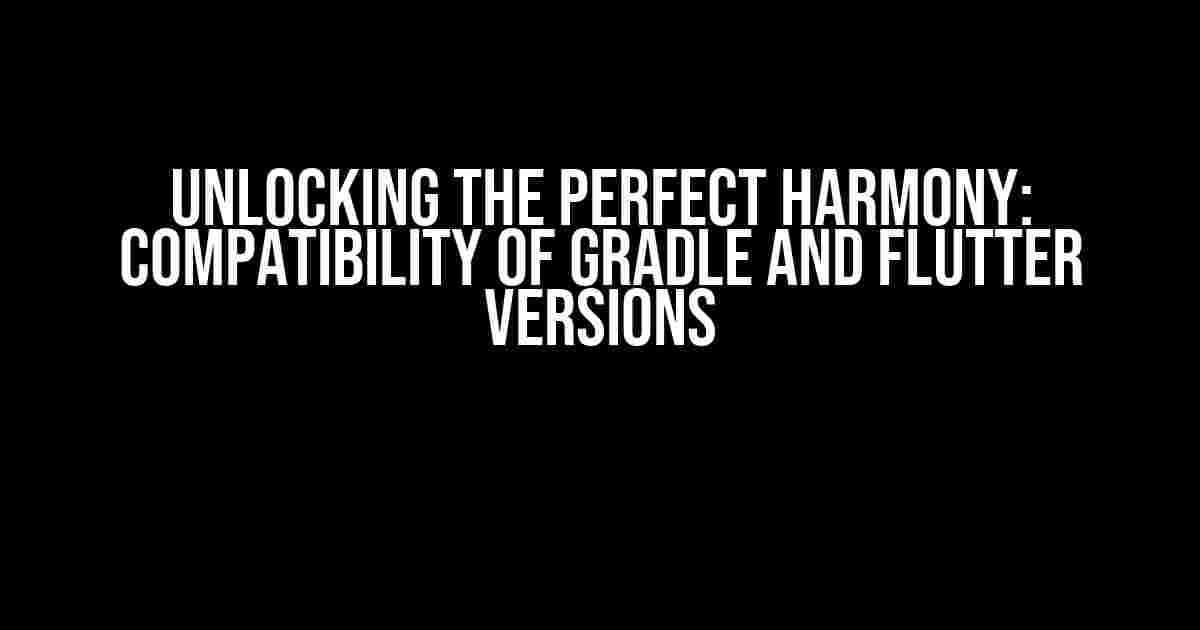As a developer, you’ve probably encountered the frustration of dealing with version incompatibilities between Gradle and Flutter. It’s like trying to fit square pegs into round holes – it just doesn’t work! But fear not, dear reader, for we’re about to embark on a journey to explore the Compatibility of Gradle and Flutter versions, and by the end of this article, you’ll be a master of harmonizing these two powerful tools.
Why Compatibility Matters
Before we dive into the nitty-gritty, let’s quickly discuss why compatibility is crucial. Gradle and Flutter are both essential tools in the world of mobile app development. Gradle is a build tool that helps manage dependencies, while Flutter is a framework for building natively compiled applications. When these two tools don’t play nicely together, it can lead to a world of trouble, including:
- Buggy builds
- Wasted time debugging
- Frustration overload!
By ensuring compatibility, you can avoid these headaches and focus on creating amazing apps that delight users.
Understanding Gradle Versions
Gradle is a constantly evolving beast, with new versions emerging regularly. As of the time of writing, the latest version is Gradle 7.4. Here’s a brief overview of the most recent versions:
| Gradle Version | Release Date | Key Features |
|---|---|---|
| Gradle 7.4 | 2022-02-15 | Improved performance, Kotlin 1.6 support, and more |
| Gradle 7.3 | 2021-11-16 | Enhanced caching, improved Kotlin support, and more |
| Gradle 7.2 | 2021-09-14 | Faster build times, improved plugin management, and more |
When working with Flutter, you’ll typically want to use a compatible version of Gradle. But how do you know which version to use?
Flutter’s Take on Gradle Versions
Flutter has its own set of recommended Gradle versions, which can be found in the official Flutter documentation. Here’s a summary:
| Flutter Version | Recommended Gradle Version |
|---|---|
| Flutter 2.x | Gradle 6.7 or higher |
| Flutter 1.x | Gradle 5.6.4 or higher |
As you can see, Flutter 2.x requires a more recent version of Gradle, while Flutter 1.x can work with older versions. This is important to keep in mind when setting up your project.
Configuring Gradle for Flutter
Now that we’ve discussed the importance of compatibility and the various versions of Gradle and Flutter, let’s dive into the configuration process. You’ll need to update your `build.gradle` file to specify the correct Gradle version. Here’s an example:
buildscript {
ext.kotlin_version = '1.6.10'
repositories {
google()
jcenter()
}
dependencies {
classpath 'com.android.tools.build:gradle:4.2.0'
classpath "org.jetbrains.kotlin:kotlin-gradle-plugin:$kotlin_version"
}
}
allprojects {
repositories {
google()
jcenter()
}
}
rootProject.buildDir = '../build'
subprojects {
project.buildDir = "${rootProject.buildDir}/${project.name}"
}
subprojects {
project.evaluationDependsOn(':app')
}
task clean(type: Delete) {
delete rootProject.buildDir
}
In this example, we’re using Gradle 4.2.0, which is compatible with Flutter 2.x. Make sure to update the `ext.kotlin_version` to match your desired Kotlin version.
Troubleshooting Common Issues
Even with the correct configuration, you might still encounter issues. Here are some common problems and their solutions:
Error: “Gradle version 7.4 is required, but 6.7 is used instead.”
Solution: Update your `build.gradle` file to use the correct Gradle version. For example:
buildscript {
repositories {
google()
jcenter()
}
dependencies {
classpath 'com.android.tools.build:gradle:7.4.0'
}
}
Error: “Kotlin version 1.6.10 is required, but 1.5.31 is used instead.”
Solution: Update your `ext.kotlin_version` in the `build.gradle` file to match the required Kotlin version. For example:
buildscript {
ext.kotlin_version = '1.6.10'
repositories {
google()
jcenter()
}
dependencies {
classpath "org.jetbrains.kotlin:kotlin-gradle-plugin:$kotlin_version"
}
}
Error: ” flutter run fails with ‘Could not determine the dependencies of task ‘:app:compileDebugJavaWithJavac’.”
Solution: Try running `flutter clean` and then `flutter pub get` to resolve dependencies. If the issue persists, try deleting the `build` directory and running `flutter run` again.
Conclusion
And there you have it, folks! By following this comprehensive guide, you should now be able to harmonize Gradle and Flutter versions like a pro. Remember to:
- Choose the correct Gradle version based on your Flutter version
- Update your `build.gradle` file to specify the correct Gradle version
- Troubleshoot common issues using the solutions provided above
By doing so, you’ll avoid the headaches of version incompatibilities and focus on creating amazing apps that delight users. Happy coding!
Keyword count: 15
Frequently Asked Question
Get the scoop on the perfect pair: Gradle and Flutter versions!
What is the minimum Gradle version required for Flutter?
The minimum Gradle version required for Flutter is 4.1 or higher. However, it’s recommended to use the latest version of Gradle to ensure compatibility and optimal performance.
Which Flutter version is compatible with Gradle 5.0?
Flutter 1.20.0 or higher is compatible with Gradle 5.0. This combination ensures a seamless development experience with the latest features and improvements.
Can I use Gradle 4.10 with Flutter 2.0?
No, Gradle 4.10 is not compatible with Flutter 2.0. You need to upgrade to a minimum of Gradle 5.0 to ensure compatibility with Flutter 2.0.
How do I check the compatibility of Gradle and Flutter versions in my project?
You can check the compatibility of Gradle and Flutter versions in your project by running the command `flutter doctor` in your terminal. This command will provide you with information about the versions of Gradle and Flutter installed in your project, along with any compatibility issues.
What happens if I use incompatible Gradle and Flutter versions?
If you use incompatible Gradle and Flutter versions, you may encounter errors, warnings, or unexpected behavior during the build process. In some cases, your app may not build at all. To avoid such issues, ensure you’re using compatible versions of Gradle and Flutter.


